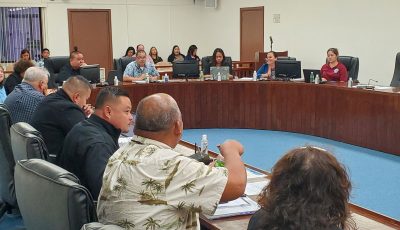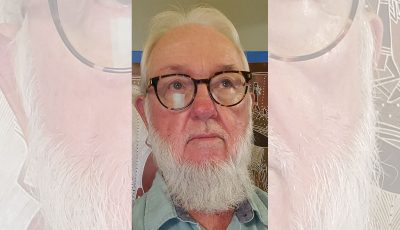School principal arrested on child porn charges
Principal allegedly admits viewing child porn out of 'morbid curiosity'

Weindl, 67, was taken to the U.S. District Court for the NMI yesterday afternoon on charges of receipt of child pornography and accessing child pornography with intent to view.
Attorney David Banes appeared as counsel for Weindl. Assistant attorneys general Rami Badawy and Garth R. Backe represented the U.S. government.
Chief Judge Ramona V. Manglona granted the prosecution’s motion to detain Weindl temporarily.
A detention hearing will be held on July 5 at 3:30pm and the preliminary hearing will be on July 13 at 1:30pm.
According to the complaint, the Public School System-issued netbook was issued to the son of an FBI special agent. The agent and his family are transferring to the U.S. mainland so he recently returned the netbook to Weindl.
The special agent, however, had installed an “e-blaster” on the netbook in 2011 in an effort to monitor his son’s Internet use. E-blaster is a commercially available computer and Internet monitoring software program.
Soon after the agent turned over the netbook to Weindl, he began receiving “e-blaster” reports indicating that the netbook was accessing child porn materials on the Internet from about June 15 to June 18, 2012.
Affidavit
In an affidavit he issued in support of the complaint against Weindl, FBI special agent Edmund H. Ewing basically reiterated the narrative stated above.
He said a special agent is in the process of transferring from the FBI Saipan Field Office to the FBI field office in the mainland.
In early June, as the school year was coming to a close, the special agent’s son advised his father that he needed to surrender his PSS-issued netbook to Whispering Palms School.
On June 8, 2012, the special agent took the netbook to a computer company and asked the service technician to repair a scratched screen and erase the hard drive so as to delete all of the schoolwork and programs on the netbook.
While the special agent did not specifically request the removal of the “e-blaster” software from the netbook, he did intend that all data and programs, including the e-blaster software, be removed, Ewing said.
That same day, June 8, the special agent turned over the netbook to Weindl and informed him that the netbook had been wiped clean.
On June 14, the special agent received an email from e-blaster showing activity for his son’s netbook. A similar report came in the next day. When the agent reviewed the reports, he noted that the visited websites appeared to contain terms indicating the presence of child pornography.
That same day, the agent contacted Weindl on the phone to try to determine whether the principal had given the netbook to somebody else. So as not to raise any suspicion, the special agent told the principal he was interested in purchasing the netbook. Weindl allegedly told the agent he had already turned over the netbook to PSS and that he would be unable to buy it because it was purchased with federal funds.
The principal was unable to tell the agent the name of the person at PSS to whom he had given the netbook.
On June 18, the agent went to PSS offices in Susupe, but each of the individuals he spoke to could not recall anyone returning a computer.
At 2:21pm that same day, the agent contacted Weindl by phone and told him that he was concerned that the computer may have some inappropriate materials on it.
Weindl told the agent the had had done some checking after the agent’s call on June 15 and determined that the computer has been “recirculated.”
On June 15 and 18, the special agent again received more “e-blaster reports.”
The agent provided Ewing a total of five e-blaster reports. The reports include numerous online searches of child pornographic materials, manually performed from the netbook.
Ewing said that he and the special agent interviewed Weindl at his office on Navy Hill on Thursday, June 28, during which they informed him that the netbook was from a federally funded grant and that they were investigating its disappearance.
Weindl explained he was embarrassed because the laptop had gone missing and he did not know where it was.
Ewing then informed Weindl that there was specific information from the computer indicating that had been used to view pornographic materials, and that activity was associated with him.
Ewing said Weindl then admitted the netbook was not stolen and that following his use to view pornographic materials, he broke it into two pieces and threw it into the “boonies.”
Ewing said the principal stated he used the netbook on his desk at school where he viewed pornographic websites.
When asked why he performed Google searches on 11-year-old girls, Weindle stated it was his own “morbid curiosity” or “inappropriate curiosity.”
Following the statements, the FBI agents arrested Weindl.
By Ferdie de la Torre
Reporter



























